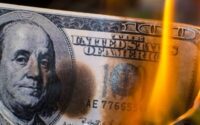Zoltan Pozsar: “A deep recession is the lesser of two evils” now
Authored by GoldFixSubstack
The most important take-away from what Zoltan said in his latest to our eyes after a long slow read-through is that he believes high rates are here to stay. That is the bottom line of bottom lines if you will. The last paragraph in his 4,000 word post we believe is intended to inform the reader of major long term changes that are coming: (emphasis ours)
If the East holds the key to the supply side, and economic war means that the supply side is held back, the West will have to develop its own supply of things such that “L” becomes “L/”. And much like the current hiking cycle is not a cycle but a tightening campaign, that recovery won’t be a recovery driven by rate cuts but by fiscally funded industrial policy…
Pozsar is consistent with previous writings here in that he continues to see the mercantilist situation currently unfolding. He sees the eventual necessity for a Bretton Woods 3 type of monetary agreement to help heal East/West trade. He foresaw the split in good physical collateral and the supply chain collapse as instigating a rebalancing of the spot world versus the financial world. He also sees the necessity for long term rates to go up while asset prices decrease.
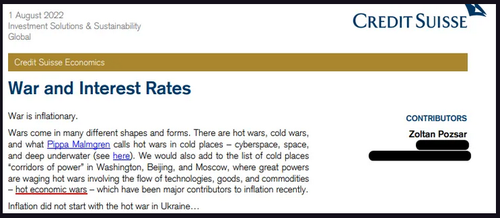
It only makes sense he would hope the Fed doubles down on its mission to quell inflation from all these observations. But what does his statement imply in practice? He pretty much states it right there. The next economic recovery will be lead by fiscal policy, not monetary. At least that’s what the Fed wants us to believe.
It means, if he is speaking for the Fed, easy monetary policy as driver of growth is dead in their minds. Fiscal policy will provide the punch bowl from now on. We actually need to spend money now to achieve all these things alluded to. Fed monetary policy will be to keep a lid on inflation as soon as the fiscal side gets going from now on.
It means supply-chains will be repatriated, geopolitical wounds will be assumed to not heal, and adaptation to a mercantilistic world will continue unabated for a decade or more. It means inflation as necessary evil is here for a long, long time. The USA is in a hot economic war that will last years. We therefore fully expect the following types of communications going forward:
Zoltan’s post is also likely a warmup to a series of future posts about how monetary policy must be tighter to offset the coming fiscal easing/investment domestically. That means inflation without free money. All monetary largesse will be targeted now. Fiscal bills, subsidies,etc. Eventually on the monetary side, that means targeted stimulus in the form of CBDC which will serve as a next gen EBT card.
Inflation will be generated on the fiscal side, both by continuing external forces and pumped by US fiscal spending on our own supply-chain infrastructure. Fed monetary policy will be to mitigate that inflation from now on. Why are we confident of this “take”?
We are confident of this position because what he describes is the exact opposite of how neo-keynesian economics works. Neo-K is all about fiscal austerity with monetary ease. He describes its opposite as the solution. At first read he is announcing a moving away from Neo-K policies. All of this is consistent with adapting to mercantilism, fragmentation, and broken global supply chains which are all tied together. We have to make stuff again.
We believe this all greatly effects Fed policy bias in the intermediate to long term. But will they be permitted to follow through on it?
If that is the plan, do they have the political will to act on it is the next question.
Pozsar unequivocally states he has “no doubts”.
Between a deep recession and damaging the Fed’s reputation as an institution, a deep recession is the lesser of two evils. The former is public service, and the latter is public disservice. The former is a central banker’s clear conscience, and the latter is a life-long burden. Whether Jay Powell will succeed in slaying inflation is not the question; in the context of economic war, we can doubt that. Rather, the question is whether he’ll try his best to slay it. There I have no doubts.
We wish he had said: Given the choice between mega inflation and a deep recession, the recession is the lesser of two evils. But we know that’s not permitted even if he wanted to. A public servant’s (especially of Powell’s magnitude) reputation should not even enter into lesser evil decision calculus. But reputation does indeed factor into it, and that is the crux of the problem for Zerohedge
Zoltan assumes the best of the Fed members. First that they are non-political animals unconcerned with their own careers and are also immune to external political influence of those who happen to be concerned with their careers. Second; that the Fed can manage the expectations of millions of market participants to willfully accept a “deep recession” as part of their patriotic duty to America.
The problem with this as Zerohedge notes last week with believing the Fed is both apolitical and able to manage market expectations is that it doesn’t have a good track record at either.
Here’s what ZH says to Pozsar’s comment:
The problem with this line of thinking is that Pozsar thinks anyone – whether Congressional Republicans or Democrats – will agree to a “depression” just to contain inflation. Spoiler alert: they won’t as it means an immediate end of all their political (and all other careers). Instead, they will browbeat Powell and the Fed, into doing just enough to avoid this outcome even if it means raising the inflation target, which we are 100% certain is how this episode ends: with the Fed raising its inflation target quietly from 2% to 3% or more, with the usual hedonic adjustments of course.
Let’s assume the Fed is not political (although we know they are as Burns himself said to Volcker here) for a moment. It still is almost impossible to remain immune to your own self interest and external pressure-politics when SHTF.
Has Jerome ever been in a real fight?
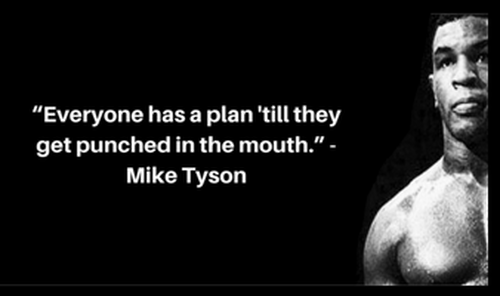
Even if Jerome Powell is pure of heart and intent on the things described; it ain’t easy when your own livelihood is on the line. Like the philosopher said: “Everyone has a plan: until they get punched in the mouth”. If (or when) things get dicey we will see how resolute the FOMC plan is. And even if the Fed members minds were resolved to forego reputation for bigger picture legacy, career Politicians may not let them.
The politicians who oversee the Fed are pretty much, well… politicians who want to get re-elected. So they will not let voting investors get too worried. Therefore the monetary addiction will continue to preserve their own career paths. They will pressure the Fed. Powell will comply or be replaced. Such is the nature of ideological bureaucracy.
Pozsar’s line of thinking assumes bigger picture team work. It assumes participants are not acting for their own survival. It also assumes the public will risk trillions of dollars, their jobs, families, etc. for the common good when they’ve been told all this by leaders who lately only take care of themselves; whether it be Fed officers trading stocks, Dr.s getting paid by Big Pharma or Senators trading on inside information. Tough time to be expecting sacrifice from the plebs now.
Historically? No, They Do Not Have The Will to Do it.
Maybe our stance is jaded or cynical, but given the empirical evidence, the alternative view that the Fed will sacrifice its reputation and in turn the FOMC members’ career paths when a career politician puts a gun to their head is just not skeptical enough. Volcker only happened after Burns himself admitted to a lack of political will in prosecuting his duties. Burns himself could not admit it until he was no longer Fed Chair! And he did that it to give cover to his successor Volcker to nuke inflation. Who will give Powell political cover to be tough now? He replaced Yellen, a person who is now the Treasury secretary.
The day Burns himself admitted the lack of will in the face of political pressures…
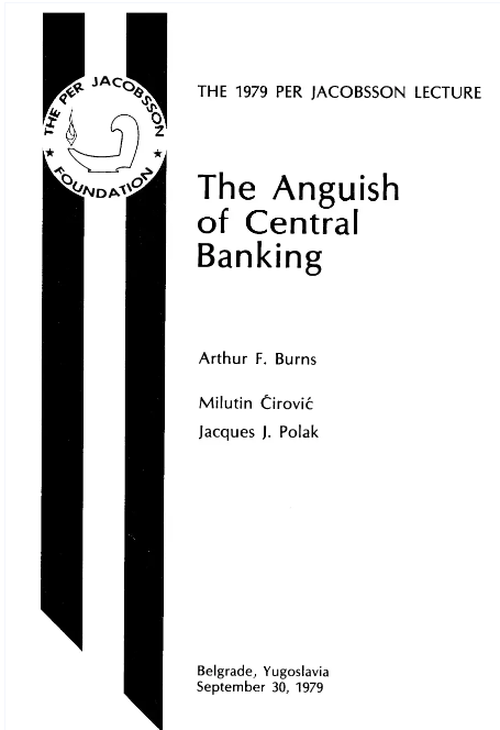
There are many reasons itemized by Burns for the Fed’s failure to contain inflation between 1970 and 1978. Many if not all of them are closely linked to politics, secular changes in public perception, and “new economics” taking root. Here is one of many shockingly clear admissions of what went wrong then and could go wrong now. Here is his own laundry list.
These are Burns’ own reasons for the Fed’s lack of political will during his tenure.
-
Philosophical and political changes
-
Desire for a more interventionist govt
-
Unevenly spread prosperity
-
Substantial societal tensions
-
Reflexive embedded societal expectations
-
Overwhelming goal of full employment
-
Environmental policies added to the inflation
-
Entitlements diminished the work ethic
-
Fed had tools to stop the inflation, but chose not to use them because it had been caught up in the social movements of the day
-
Fed is beholden to Congress, how could it stand in they way of societal changes that Congress was attempting to enact
-
Understand what the appropriate level of “full employment” was
-
Central Banks can’t stop politically driven inflation. They have the tools, but not the will
-
Inflation was fed by high unemployment, deficits, money creation
Hard to believe this was written in 1979. As we can see, nothing has changed. But Numbers 2, 9, 10, and 12 is what concerns us here.
Inflation Control without Political Will is Illusory
The Fed only got the political will to do what was needed after Burns admitted Fed impotence in the face of political pressures. We have not had such an admission yet. Until we do, Powell will be pressured to varying degrees or be replaced.
Arthur Burns in August 1979 with Volcker in attendance:
My conclusion that it is illusory to expect central banks to put an end to the inflation that now afflicts the industrial democracies does not mean that central banks are incapable of stabilizing actions; it simply means that their practical capacity for curbing an inflation that is continually driven by political forces is very limited.
But to come full circle, Pozsar’s note indicates that they are at least going to try. They can start by practicing what they preach. Show us the Fed is neither political, nor carrying water for the bigger banks in this time of emerging crisis. If the time for handholding and guidance is at an end as Zoltan implies, then the time for prevarication must also be at end if they want the market to take them seriously.
The 3% Political Canary
The key to all of this for us is if/when the Fed starts talking about raising the inflation target from 2% to 3% or more, then you know they are beginning to bend to political pressures. That will kill the canary for their ability to do what they hope to for us. They had already moved the goal post back in 2020 when there was no panic. In its 2020 “Statement on Longer-Run Goals and Monetary Policy Strategy,” the FOMC changed that goal to inflation that averages 2 percent over time, in contrast to aiming for 2 percent at any given time.
At 3% target the bird dies…
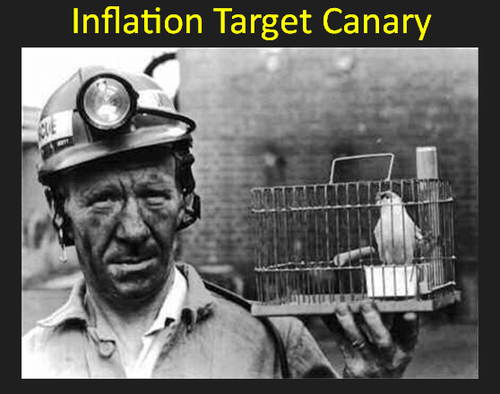
We fear they will move the target more meaningfully again soon.
Continue reading here
Free Posts To Your Mailbox
Contributor posts published on Zero Hedge do not necessarily represent the views and opinions of Zero Hedge, and are not selected, edited or screened by Zero Hedge editors.
[ad_2]
Source link

